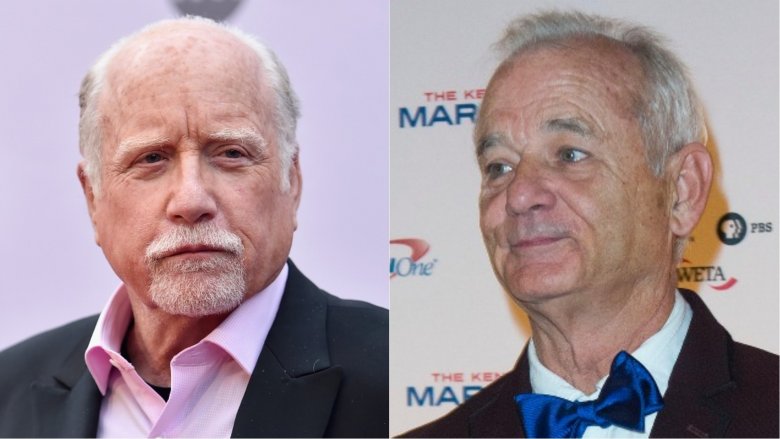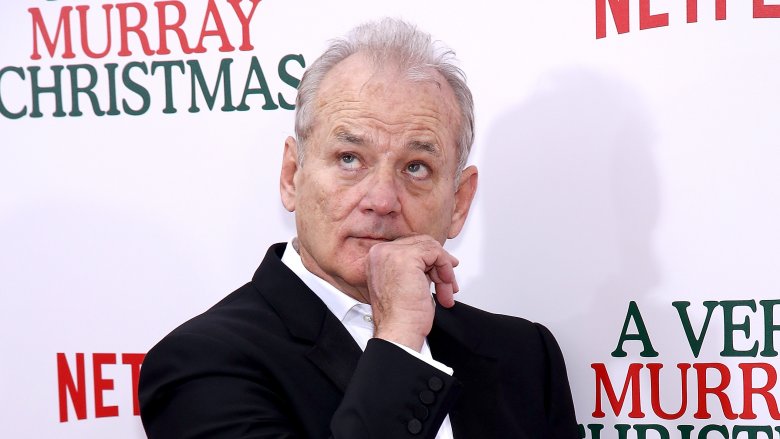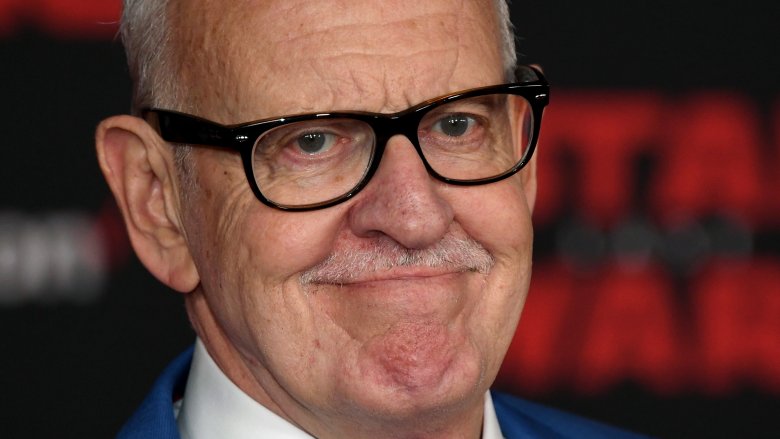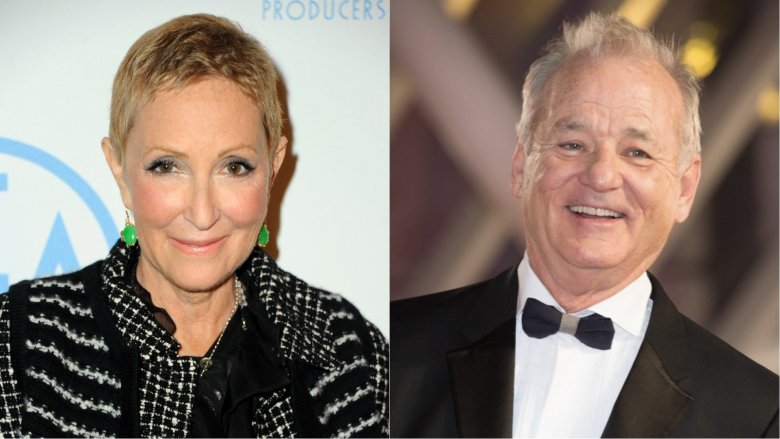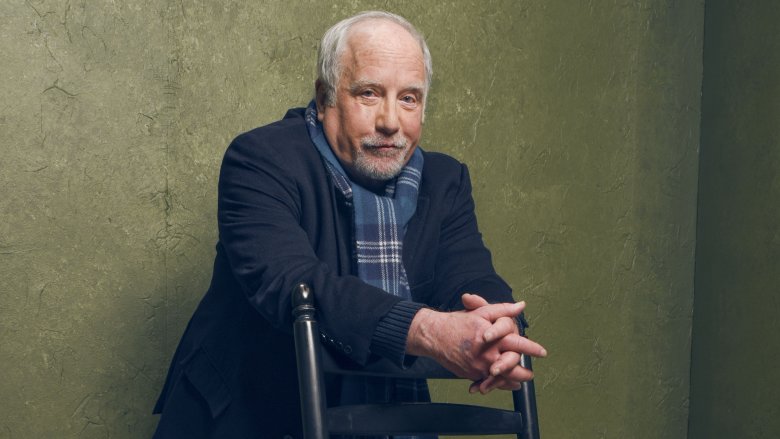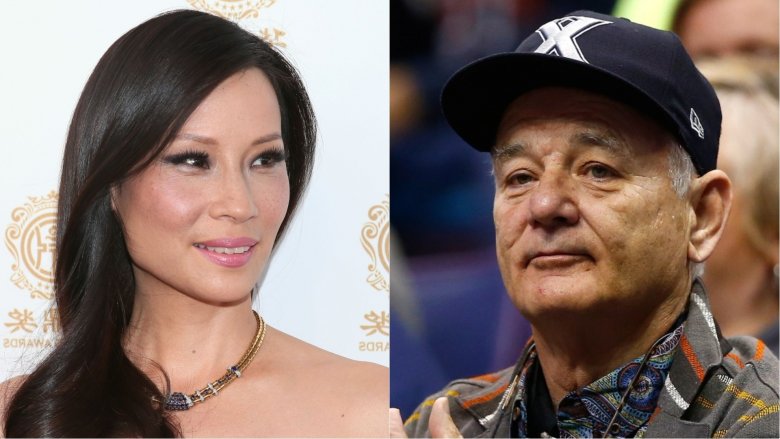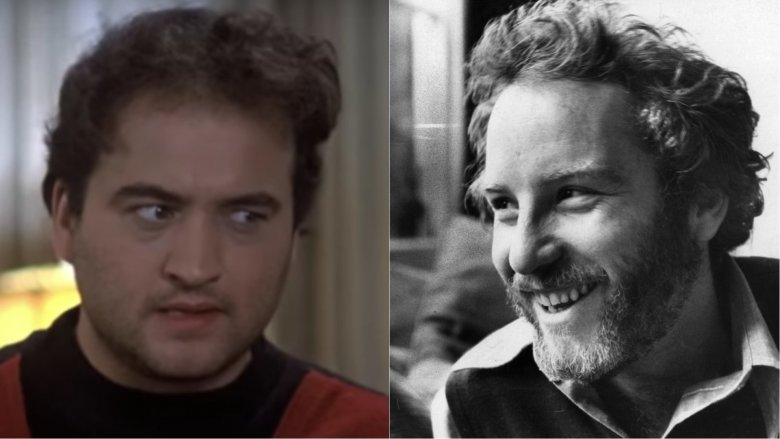The Strange Feud Between Richard Dreyfuss And Bill Murray
Though it's not one of the more well-known Hollywood feuds, like Donald Trump vs. Rosie O'Donnell or Tom Cruise vs. Brooke Shields, there is big beef between Richard Dreyfuss and Bill Murray. Actually, it's pretty one-sided and it all stems from What About Bob?, the 1991 romp starring Murray as a deranged, yet somehow lovable mental patient who terrorizes his psychiatrist, played by Dreyfuss. Apparently, life truly inspired art because Dreyfuss, to this day, can't stand Murray, and Murray seems to look back fondly on the torment of his co-star. How did it all go so wrong? Here's the strange story.
Dreyfuss has been dogging Murray for years
When Dreyfuss was asked to reflect on What About Bob? during a 2009 interview with The A.V. Club, his only response was a rebuke of Murray.
"Funny movie. Terribly unpleasant experience," Dreyfuss said. "We didn't get along, me and Bill Murray. But I've got to give it to him: I don't like him, but he makes me laugh even now. I'm also jealous that he's a better golfer than I am."
Years later, Dreyfuss reiterated the remark almost verbatim to The Telegraph, adding, "Bill Murray is a pig. What really irritates me about him is that he's a good golfer and I'm not and also, he's funny enough that, even now, although I loathe him, he makes me laugh." One month after that interview, Dreyfuss popped up at Fan Expo in Canada, where he said—you'll never guess—"[Murray]'s an Irish drunken bully, okay? That's it. And he's a better golfer than I am. And he makes me laugh, even though I find him a despicable pig...he's a schmuck."
Dreyfuss' repeated use of the stock line—golf joke and all—in place of any kind of contextual anecdote is perplexing. As far as we can tell, he never explicitly spelled out the details of his intense dislike for Murray, but that's not a problem, because Murray handled that on his own.
Murray admits to tormenting Dreyfuss
Though he's now become something of a legendary recluse, particularly when it comes to granting interviews, in 1991 Murray spoke candidly with Deseret News about the pleasure he took in "annoying" Dreyfuss. "While he was talking, I got in real close to crowd him, I put my head on his shoulder, screamed into his ear and did all sorts of annoying things," Murray said. "Some of that was even in the script...no wait, none of that was in script. I made it all up."
Murray goes on to describe how "liberating" it was to play the character of Bob Wiley in What About Bob?. He said he decided from the beginning that there would be "no limit" to the amount of problems Wiley would have, which ultimately led to an increasing nightmare for both Dreyfuss' character and the actor in real life. "Anything that I could think of to annoy someone in a scene, particularly if it was Dreyfuss, I went with it," Murray said.
But it wasn't malicious, at least, according to Murray. In 1993, he told Entertainment Weekly, "[Richard Dreyfuss and I] didn't get along on the movie particularly, but it worked for the movie. I mean, I drove him nuts, and he encouraged me to drive him nuts."
Really? Because that is not how Dreyfuss or the director of the film tells it.
Director Frank Oz admitted there was tension on the set
Murray may have sensed a feeling of chaotic collaboration in his method approach to irritating Dreyfuss, but for the director of the film, Frank Oz, the on-set dynamic was tense. Describing his experience to IGN as "a tough, tough movie to shoot," Oz specifically cited creative differences with Murray and Dreyfuss.
"Sometimes you had to get a little hard, but it was a tense time because Bill (Murray)...and the writer and the producer...and Richard Dreyfuss...and me...and Disney (although less so Disney, I must say they were more supportive)...all had our view on how to make the script better," Oz said.
Oz was quick to add that he didn't feel like the tension was born of "mean-spiritedness" and that it actually helped to make the movie better, but in a later interview with Ain't It Cool News, he admitted that during the shoot, he worried it was all going wrong. "I was really scared to death that we had a piece of s**t, because it was so impossible to judge it," Oz said. "I felt I knew what I was doing, but there was this huge sigh of relief when the movie worked."
Dreyfuss wasn't the only one Murray tormented
That tension was apparently applied evenly across the entire production team. Even a producer wasn't immune to the oddball and quasi-frightening ways of Murray on the film set.
Speaking with the Los Angeles Times, producer and co-writer Laura Ziskin admitted that Murray "playfully" threw her into a lake and also "threatened to throw me across the parking lot and then broke my sunglasses and threw them across the parking lot." Charming, no?
This is pure speculation here, but maybe Dreyfuss observed some of this stuff and didn't take kindly to the crew of the film being terrorized in the name of creative expression.
Dreyfuss was kind of an egomaniac
Clearly, we're framing Murray as the main culprit behind the long-standing ill will between him and Dreyfuss, but is there blame to go around?
By the time Murray and Dreyfuss came together for the film, Dreyfuss already had a reputation for being "difficult," if not an outright egomaniac.
The subject was even probed as far back as Cameron Crowe's 1978 Rolling Stone profile of the Jaws star. In that piece, Dreyfuss said things such as, "I had a twelve-year plan. And this was it. Real simple. From the time I was twelve to the time I was eighteen, I knew I would be a star when I was thirty-two. Okay?" He followed that by acting incredulous when asked if making those kinds of statements had anything to do with his unsavory reputation. "I don't know why that's taken as arrogance," Dreyfuss countered.
Even long after What About Bob?, Dreyfuss had not let off the gas on his surliness. In a 2005 interview with The Independent, he cut off the interviewer who tried to "break the ice" with some polite small talk, then later lamented having to do press at all. "It is this insistence on being reduced to just a few pages... You just cannot make me fit into a small box," Dreyfuss complained.
Granted, neither of those interviews has anything to do specifically with the Murray feud, but perhaps if Dreyfuss didn't take himself so seriously, he wouldn't have been such an easy target for the notorious mischief-maker.
Murray has feuded with collaborators in the past
Speaking of making mischief, Murray has a legendary reputation of his own outside of being the cheerfully aloof star who pops into random people's engagement photos. On the set, he can be decidedly less fun, like in the case of his antics while shooting Charlie's Angels (2000), which resulted in reported feuds with both the director, McG, and one of his co-stars, Lucy Liu. To hear Murray explain it, the McG stuff was completely made up, and the thing with Liu was just a quick tiff over what she thought was a personal insult.
Then there was the infamous falling out between Murray and his longtime friend and Ghostbusters co-star Harold Ramis. According to Uproxx, Murray's "demeanor" and "increasingly erratic" behavior on the set of the Ramis-directed Groundhog Day (1993) led to a 21-year period of silence between the two former friends. Murray never spoke about the rift, although he did reportedly make up with Ramis just before his death in 2014.
The list of Murray's on-set tomfoolery goes on and on. Directors and casting agents supposedly have to use a notoriously mysterious voicemail to get in touch with him. Nobody knows if or when he's going to show up to shoot, and when he does, it's a toss-up as to which Murray they're going to get. The point is: Did Dreyfuss, or anyone else on the set of What About Bob?, even stand a chance against Murray's quirkiness?
Dreyfuss has had issues with co-stars, too
Long before What About Bob?, Dreyfuss got pushed around by another looming personality on the set of Jaws in 1975.
Robert Shaw, the screen legend who starred as Quint opposite Dreyfuss' Hooper and Roy Scheider's Chief Brody, apparently had it in for Dreyfuss as soon as he got a whiff of the young actor's infamous arrogant attitude. In a behind-the-scenes feature for the classic aquatic horror flick, Scheider, director Steven Spielberg, and Dreyfuss all confirm the rivalry.
Scheider says Shaw described the young Dreyfuss as "a young punk with no stage experience" who "needed a slapping down." From Dreyfuss' perspective, he felt "competitive" with Shaw, although he confessed that he often abandoned the competition due to Shaw's stature and gravitas. "In private, [Shaw] was the kindest, gentlest, funniest guy you ever met," Dreyfuss said. "Then we'd walk to the set, and on the way to the set he was possessed by some evil troll who would then make me his victim."
To Spielberg, it was all part of the process. "Robert would basically humiliate Richard into taking a chance," the director said. "It got ugly, but it was also Quint and Hooper living out that relationship as Shaw and Dreyfuss."
Spielberg's sentiments strangely echo those of What About Bob? director Oz some 20 years later, and it all begs the question: Is Richard Dreyfuss an amazing actor, or does he have to be psychologically manipulated into putting out a great performance?
Did this all start with Dreyfuss' 1978 SNL appearance?
Could the strife between Dreyfuss and Murray have been brewing for more than a decade before either set foot on the set of What About Bob?
According to Vanity Fair's oral history of Saturday Night Live, Dreyfuss got a healthy dose of psychological torture when he hosted the famed late night sketch comedy show back in 1978. This time, it was John Belushi messing with Dreyfuss' head, but to hear castmate Murray describe it, he was all too delighted to bear witness.
Belushi was known as a partier and prankster who liked to mess with hosts whom he perceived as overly self-important. In order to freak them out, Belushi would pretend to be dysfunctionally sick right up to showtime, making the straight-laced host think the show would be a disaster. Then he would turn around and deliver his usual, gut-busting performance.
"He would sucker-punch guys that didn't see it coming. And the more actorish they were, the worse they got it," Murray told Vanity Fair. "If it had been someone who'd won an Academy Award or something, they didn't have a chance. I think he did it to Richard Dreyfuss."
The ruse worked. Dreyfuss told Vanity Fair, "I remember that during the final dress rehearsal John Belushi couldn't stand up. He'd been, like, falling around and mumbling and forgetting everything. I thought, 'He'll never make it through this show.'" Dreyfuss also admitted to being impressed by Belushi's ability to "take drugs better than I could," but perhaps he wasn't so thrilled with being the butt of the joke that could have just as easily put him off of his own performance that night.

